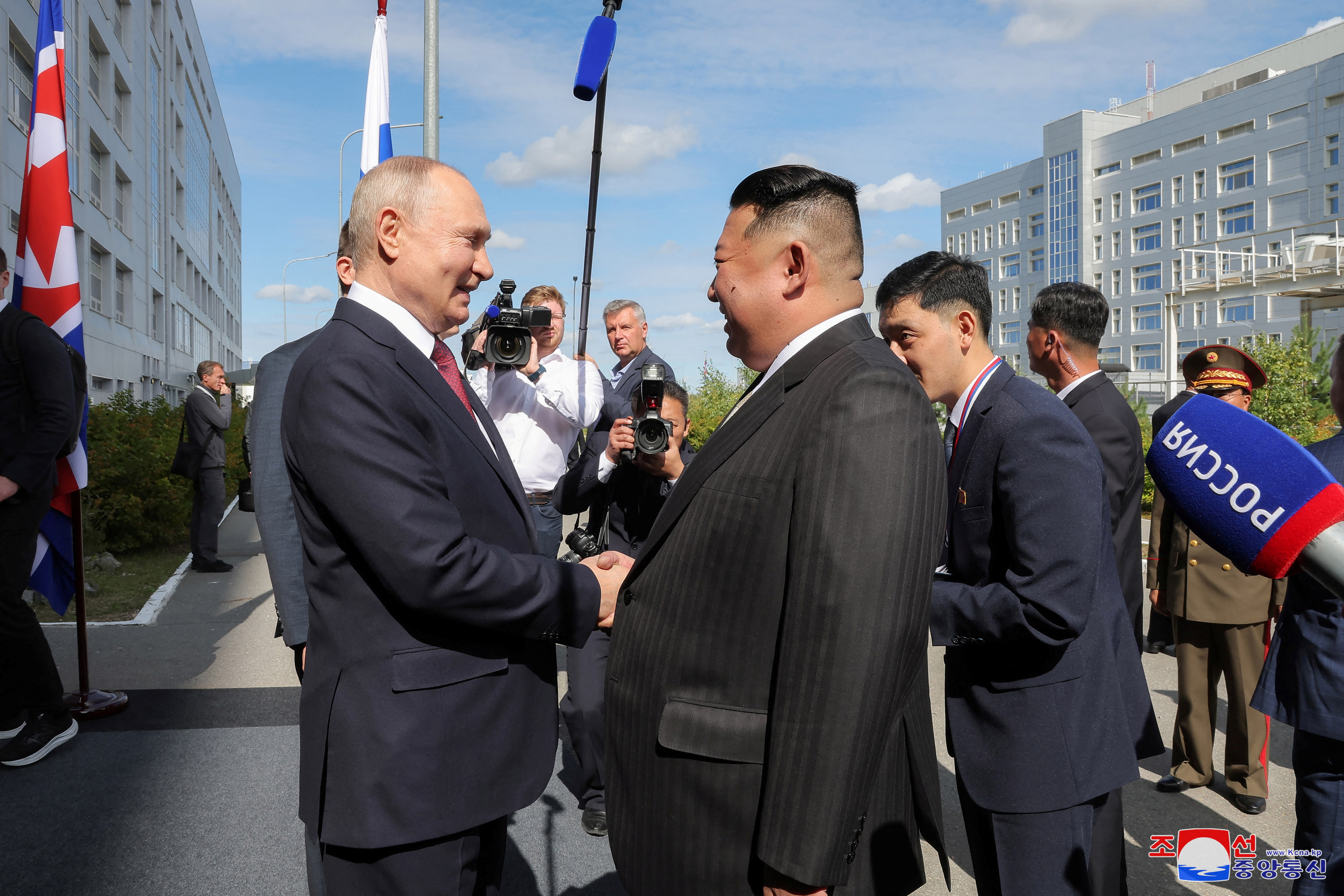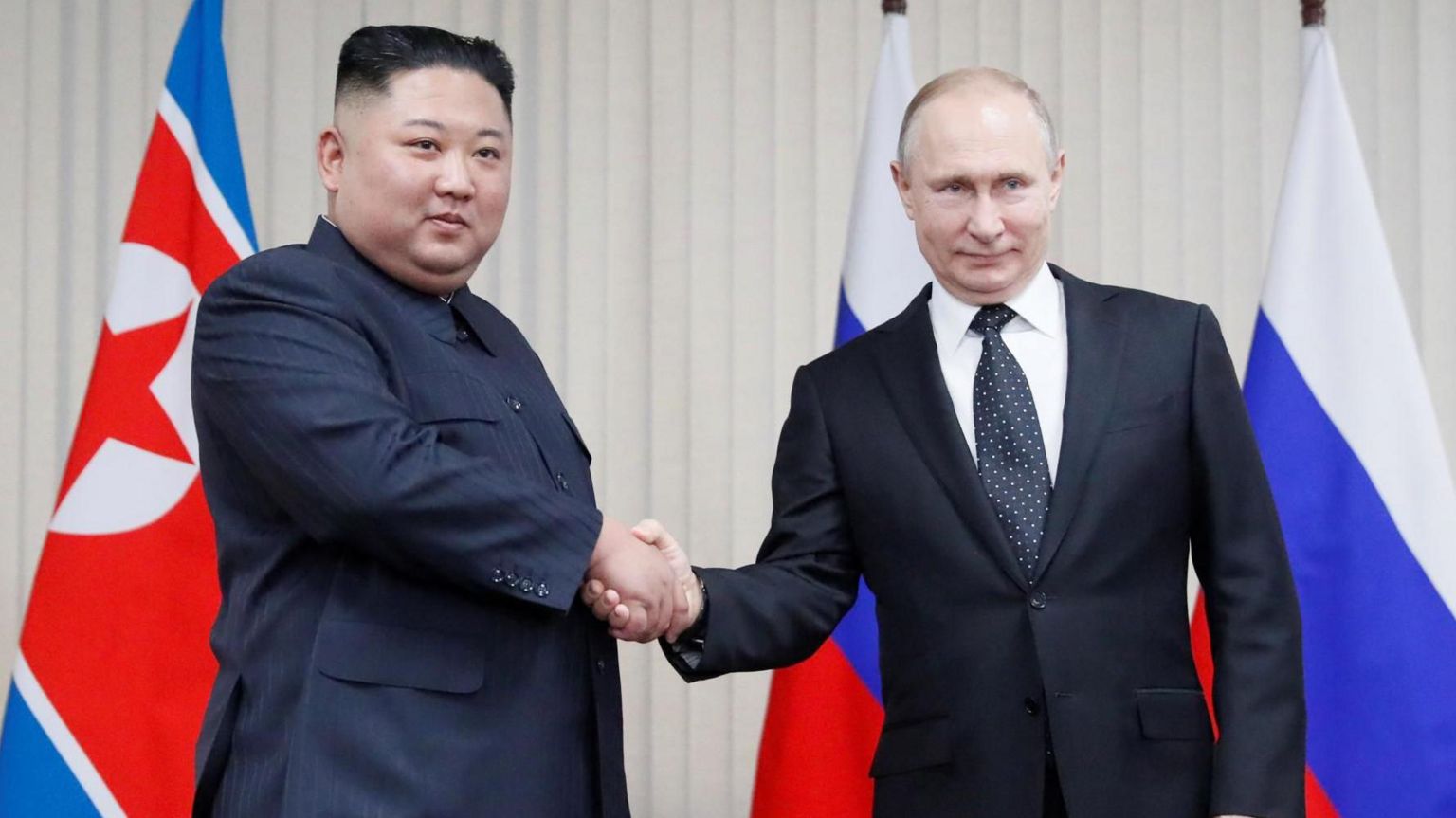The Kremlin announced that Vladimir Putin will visit North Korea for two days beginning on Tuesday. This will be the Russian president’s first visit to the nation in over twenty years and the most recent indication of a growing alignment that has caused great anxiety throughout the world.
Putin is making a rare foreign visit since Russia started its full-scale invasion of Ukraine in 2022. Kim Jong Un, the leader of North Korea, has not welcomed a world leader in Pyongyang, one of the most politically isolated cities on Earth, since the Covid-19 pandemic.
The much-awaited visit is predicted to strengthen the already developing relationship between the two countries, which is motivated by Putin’s need for assistance in his continuous war on Ukraine and their common hatred of the West.
Putin is scheduled to visit North Korea on Wednesday and then return to Hanoi for another two days, a show of Communist-ruled Vietnam’s links to Russia that is sure to irritate the US.
“Very eventful” is the agenda for Putin’s visit to North Korea, according to his advisor Yuri Ushakov, who spoke at a news conference on Monday. Ushakov stated that the main events of the visit are set for Wednesday, and both leaders intend to sign a new strategic cooperation.
Assuring more stability in northeast Asia, Ushakov stressed that the agreement is not aggressive or directed against other nations. He said the new pact would supersede the 1961, 2000, and 2001 agreements between Pyongyang and Moscow.
As to the Russian state media RIA, Ushakov stated, “The parties are still working on it, and a final decision regarding its signing will be formed in the coming hours.”

Russia’s Putin To Visit North Korea In Rare Trip As Anti-West Alignment Deepens
While some have voiced worries that Moscow may be breaking international sanctions to support Pyongyang’s development of its fledgling military satellite program, the US, South Korea, and other nations have charged North Korea of giving Russia significant military support in recent months. Denied North Korean weaponry exports from both nations.
Putin is making a reciprocal visit to Russia’s far eastern territory, which Kim made last September when he visited a rocket launch facility and a fighter jet manufacturer in his armored train.
In a letter to Putin last week honoring Russia’s national day, June 12, Kim praised the future of the nations’ “meaningful ties and close comradeship.”
As the official Rodong Sinmun newspaper reported, Kim said, “Our people give full support and solidarity to the successful work of the Russian army and people.”
Russian official media quotes the Kremlin as saying that Russia wants to establish cooperation with North Korea “in all possible areas.”
The gathering occurs only a few days after Ukrainian President Volodymyr Zelensky attended a summit of the Group of Seven (G7) developed economies in Italy. At the summit, Western leaders reaffirmed their unwavering support for Ukraine and decided to use proceeds from frozen Russian assets to support a $50 billion loan to the war-torn nation.
It also followed a more than 100-nation and organization-attended international peace summit sponsored by Kyiv over the weekend. The summit was intended to mobilize support for Zelensky’s peace plan, which asks for a total withdrawal of Russian forces from Ukrainian territory.
A day before the conference, Putin rejected those attempts by presenting his terms for peace, which included Kyiv’s withdrawal from its NATO application and the removal of Ukrainian forces from four partially occupied areas. Ukraine and its allies considered this to be a nonstarter.
It is widely believed that Putin is using his visit to North Korea to try to win Kim over to his war effort. This objective may become more pressing when long-delayed American military assistance for Ukraine becomes available.
Russia’s Putin To Visit North Korea In Rare Trip As Anti-West Alignment Deepens
US Secretary of Defense Lloyd Austin informed US Congress last month that Russian forces had been able to “get back up on their feet” because of the supply of Iranian drones and North Korean missiles.
Pyongyang sent some 6,700 containers to Russia between August and February. The military ministry of South Korea stated earlier this year that these containers could hold up to 500,000 rounds of 122 mm multiple rocket launchers or over 3 million rounds of 152 mm artillery shells.
Pyongyang and Moscow dispute such weapons supplies; a top North Korean official described the claims as an “absurd paradox” last month.
Last week, A Kremlin spokesman addressed worries that Russia is considering giving Pyongyang sensitive technologies in return for those commodities. He said the countries’ “potential for developing bilateral relations” was “profound” and “should not cause concern to anyone and should not and cannot be challenged by anyone.”
Putin in international politics
Putin last paid Kim Jong Il, Kim’s late father, a visit in 2000.
The Russian president is traveling now as he seems eager to re-establish himself on the international scene, removing an impression of isolation following his highly denounced invasion of Ukraine by enlisting like-minded allies.
On a state visit to Beijing last month, Putin and Chinese President Xi Jinping unequivocally declared their united hostility to what they perceive as a US-led global order.
Foreign ministers from China, Iran, South Africa, and Brazil were in Moscow last week for a conference of the BRICS group of important developing nations.

Russia’s Putin To Visit North Korea In Rare Trip As Anti-West Alignment Deepens
For Kim, who has not wavered in the face of years of international sanctions over his illicit nuclear weapons program, Putin’s decision to strengthen relations with North Korea has also been beneficial.
It falls during a time when there is growing anxiety among other countries about the intentions of the North Korean leader, who has increased his use of aggressive language and abandoned a long-standing strategy of pursuing a peaceful reunion with South Korea.
Kim’s home audience will receive a signal of his international clout from the head of a permanent member of the UN Security Council and an opportunity to press Moscow for much-needed economic and scientific assistance.
Formerly, Russia supported UN-backed investigations and international sanctions investigating North Korea’s illicit weapons program, which includes tests of long-range intercontinental ballistic missiles that could theoretically reach the US mainland.
But that relationship seems to have changed as Russia seems to be depending more and more on North Korea and having more problems with the West. Moscow voted against a UN resolution in March that would have allowed impartial monitoring of North Korea’s infractions of Security Council sanctions to resume.
SOURCE – (CNN)









